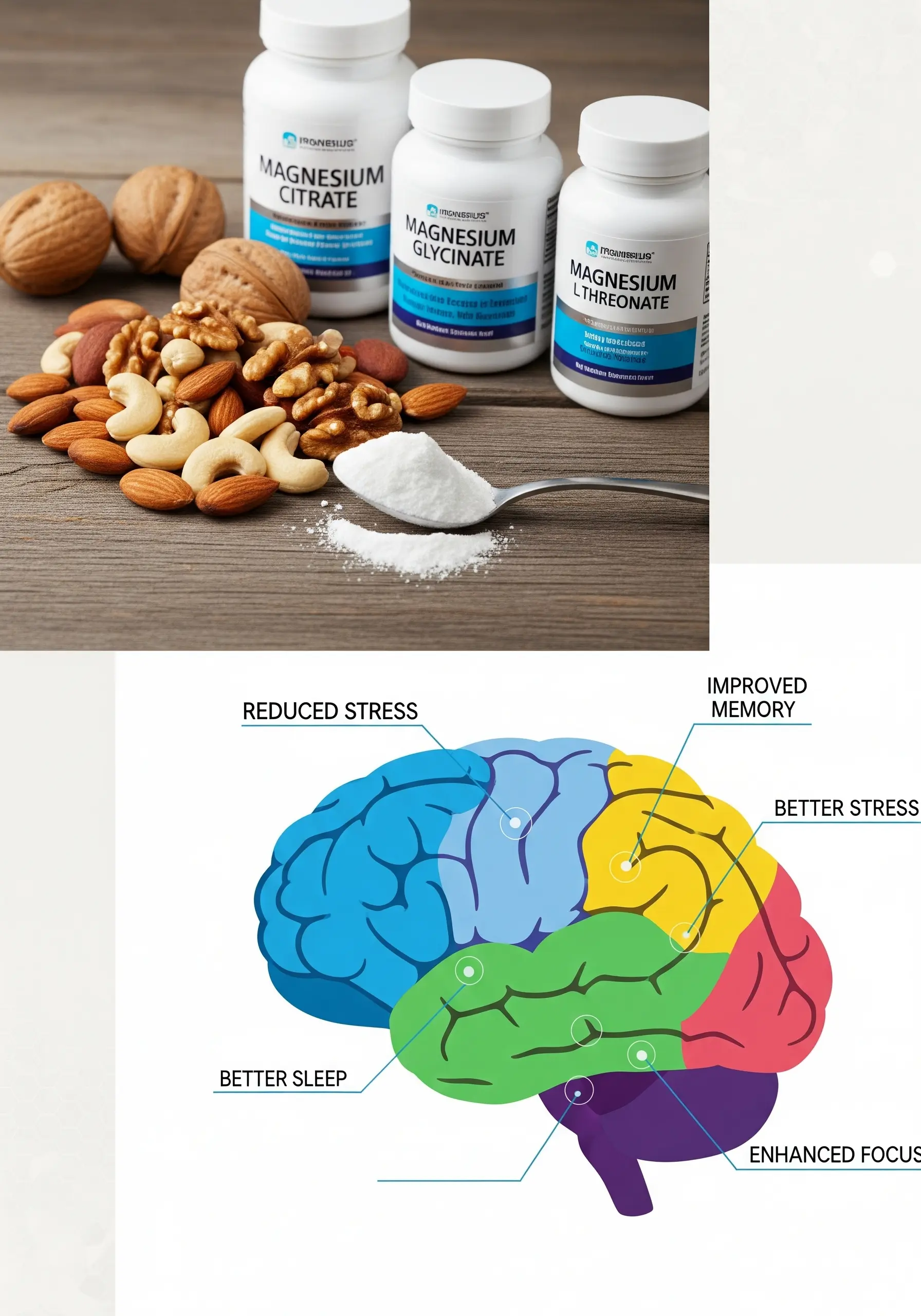

September is the month when we return to our work and study routines.
Fatigue after summer, changes in sleep patterns, and increased mental workload often lead to problems with concentration and memory.
During this period, nutrients that support cognitive function, energy, and stress resilience come to the rescue.

Omega-3 Fatty Acids
Omega-3 (EPA and DHA) are essential nutrients for brain function. They are structural components of neuron cell membranes and affect signal transmission.
- Research shows that regular DHA intake is associated with better memory in students and a reduced risk of cognitive decline in older adults【1】.
- Sources: cold-water fish, fish oil supplements, or algae supplements.

B-Complex Vitamins
B vitamins (B6, B9, B12) participate in the synthesis of neurotransmitters (serotonin, dopamine, acetylcholine).
- B9 (folates) are important for the transfer of genetic information and brain cell growth.
- B12 supports the formation of the myelin sheath around neurons.
- Low levels of these vitamins are associated with memory decline and an increased risk of depression【2】.

Magnesium
Magnesium is a mineral that regulates over 300 enzymatic reactions, including nervous system function.
- Magnesium-L-threonate has a special ability to cross the blood-brain barrier, enhancing synaptic plasticity【3】.
- Magnesium deficiency often manifests as irritability, sleep problems, and poor concentration.

Ginkgo Biloba
A plant extract that improves microcirculation in the brain and oxygen supply to cells.
- Clinical studies have shown ginkgo biloba supports memory in people with age-related changes【4】.
- It is often included in combined nootropic supplements.

Choline and Phosphatidylserine
These nutrients are building blocks for brain cell membranes.
- Choline is a precursor to acetylcholine, the memory neurotransmitter.
- Phosphatidylserine helps reduce fatigue and stress, supporting cognitive function in students and older adults【5】.
Table 1. Top 5 nutrients for the brain
| Nutrient | Main Function | Sources | Average Daily Dose |
|---|---|---|---|
| Omega-3 (EPA, DHA) | Neuron structure, memory | Fish, supplements | 250–1000 mg DHA |
| B vitamins B6, B9, B12 | Neurotransmitters, myelin | Green vegetables, meat, supplements | B6 — 1.4 mg, B9 — 400 mcg, B12 — 2.4 mcg |
| Magnesium | Synapses, stress, sleep | Nuts, grains, supplements | 300–400 mg |
| Ginkgo Biloba | Microcirculation, memory | Extract | 120–240 mg |
| Choline, Phosphatidylserine | Cell membranes, attention | Eggs, soy, supplements | Choline — 250–500 mg, PS — 100–300 mg |
Practical Use of Nutrients in September
Theory becomes valuable only when it can be applied in everyday life.
In September, our needs differ depending on age, work style, and stress level.
Students face intensive study, office workers deal with long hours of computer work, and older adults experience natural age-related changes.
That’s why it is important to select nutrients for specific situations: from exam preparation to recovery after demanding work weeks. Below are examples of how beneficial substances can support cognitive function in different circumstances.
Table 2. Practical Use of Nutrients in September
| Situation | Recommended Nutrients | Additional Tips |
|---|---|---|
| Students before studying | Omega-3, B-complex, choline | Regular sleep, planning |
| Office work | Magnesium, ginkgo, phosphatidylserine | Breaks every 2 hours |
| People 40+ | Omega-3, B12, ginkgo | Blood pressure control |
| Chronic stress | Magnesium, ashwagandha (as adaptogen) | Breathing exercises |
| High workload periods | Combined formulas | Balanced nutrition, hydration |
Conclusion
Cognitive function can be supported not only by brain training but also by the proper choice of nutrients.
September is a good time to start prevention: omega-3, B vitamins, magnesium, ginkgo biloba, and phosphatidylserine help stay productive and maintain mental clarity.
References
- Yurko-Mauro K. et al. Beneficial effects of docosahexaenoic acid on cognition in age-related cognitive decline. Alzheimer’s & Dementia. 2010.
- Smith AD, Refsum H. Homocysteine, B vitamins, and cognitive impairment. Annu Rev Nutr. 2016.
- Slutsky I. et al. Enhancement of learning and memory by elevating brain magnesium. Neuron. 2010.
- Laws KR. et al. Ginkgo biloba for cognitive impairment and dementia. Cochrane Database Syst Rev. 2012.
- Jorissen BL. et al. The influence of phosphatidylserine on cognitive performance. Nutr Neurosci. 2001.




